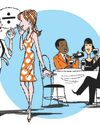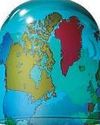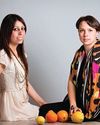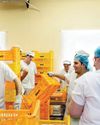With early diagnosis and treatment of colon cancer, thousands of lives could be saved
TALL, LEAN STEFFI WESSA OF LANDAU, GERMANY, had never had a serious illness, so when in late 2013, after she turned 55, her physician suggested they add a routine colorectal cancer screening by colonoscopy to her regular medical check-up, Steffi had no reason for concern.
Colorectal cancer (CRC), often called colon cancer, is a malignancy in the large intestine, that twisty tube through which waste products exit the anus. The last six or so inches of colon are called the rectum.
During the colonoscopy—examination of the entire colon with an endoscope—the doctor found two polyps, benign growths in the intestinal wall that have the potential to turn cancerous if left untreated. These the doctor removed during the procedure. But there was something more: a five centimeter growth in the rectal area. It appeared to be a carcinoma.
A biopsy confirmed the physician’s suspicions: Steffi had colorectal cancer. On hearing the news, Steffi was distraught. “My world collapsed. To me, cancer meant death.”
Steffi was just one of approximately 447,000 Europeans to be diagnosed with colon cancer that year, and the numbers are increasing annually. Globally, CRC is the third most common of all cancers, and in continental Europe it is the second most common malignancy, after breast cancer which has about 464,000 annual diagnoses. It’s also the second most deadly, killing about 215,000 Europeans every year.
But it needn’t be a killer. Colorectal cancer, when discovered in its early stages, is one of the most treatable cancers. And Steffi’s had been caught early, before it could spread.
WHAT PUTS US AT RISK of getting colon cancer in the first place? The risk increases with age—those older than 50 make up the vast majority of cases—but it can strike much younger people as well.
Diese Geschichte stammt aus der September 2017-Ausgabe von Reader's Digest International.
Starten Sie Ihre 7-tägige kostenlose Testversion von Magzter GOLD, um auf Tausende kuratierte Premium-Storys sowie über 8.000 Zeitschriften und Zeitungen zuzugreifen.
Bereits Abonnent ? Anmelden
Diese Geschichte stammt aus der September 2017-Ausgabe von Reader's Digest International.
Starten Sie Ihre 7-tägige kostenlose Testversion von Magzter GOLD, um auf Tausende kuratierte Premium-Storys sowie über 8.000 Zeitschriften und Zeitungen zuzugreifen.
Bereits Abonnent? Anmelden

The Secret Lives Of Passwords
We despise them—yet we imbue them with our hopes, dreams, and dearest memories.
7 Doctor Approved Natural Remedies
A plant fix over a prescription drug? Some doctors swear by it.
The Nature Cure
Doctors from California to South Korea believe they’ve found a miracle medicine for our mental health and creativity.

Oh, Behave!
The classiest ways to split a bill, send your sympathies,say no, and more.

World Of Medicine
News from the world of medicine.

Surviving Substandard Sleep
How to cope after a bad night’s slumber

Good News
Some of the Positive Stories Coming Our Way

Medical Mystery
THE PATIENTS: Katie*, 26, and Ella*, 24, of Boston, United StatesTHE SYMPTOMS: Late-onset speech and motor-skill delayTHE DOCTOR: Dr. David Sweetser, chief of medical genetics and metabolism at the Mass General Hospital for Children

News From The World Of Medicine
A commission of experts assembled by the medical journal

Making Yogurt, Healing Minds
How a psychologist turned entrepreneur— and helped turn around lives